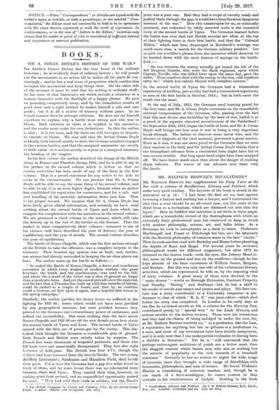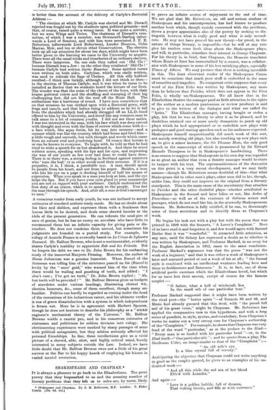MR.. BALFOUR BROWNE'S DIVAGATIONS..
MR. Bala-ova BROWNE hex supplemented his Forty Years at the Bar with a volume of Recollections, Literary and Political, which make very good reading. The keynote of the book is struck in the statement on p. 14 : "2 had from the first set my face against becoming a lawyer and nothing but a lawyer, and I entertained the idea that a man should be an all-round man, not like some of the dried ferns in a herbarium, which are flattened out into thin dry layers." How he fulfilled this intention is set forth in these pages, which are a remarkable record of the thoroughness with which an extremely busy professional man has contrived to keep in touch with modern philosophy, science, art, and belles lettres. As a Scotsman he took to metaphysics as a duck to water. Professors MacDougall and Fraser at Edinburgh led him into the labyrinth with the Scottish philosophy of common-sense in the late "sixties." Then he took another road with Berkeley and Hume before pluiabing the depths of Kant and Hegel. For several years lie reviewed philosophical works for different magazines, but after 1873 he returned to the beaten track—with his eyes, like Johnny Head-in- Air, more on the ground and less on the swallows—though he has kept abreast of the later excursions of William James, Bergson, and Eucken. But this was only one side of Ins voluminous literary activities, which are represented, be tells tie, by the imposing total of sixty volumes. A great many of these were devoted to tho " main chance "—works on Borough Extension, Contract Property and Penalty, " Rating " and Railways—but he has a shelf to his creak of novels and essays and poems and plays. His first ven. ture was a story contributed to a University magazine—a pre- deceseor to that of which "it, L. S." was joint-editor—which died before his story was completed. In London in his early days at the Bar he reviewed novels at 10s, a column for the Morning Poet, contributed gossip by "special wire" to the Leeds Mercury and serious articles to the serious reviews. These Were his recreations and they had the charm of being indulged in under the rose, for, as Mr. Balfour Browne reminds us, in a profession like the Law, a reputation for anything but law or glibness is a misfortune to, a man, and most of my recreations have been strictly anonymous, and it is only now that I can make partial confession to having been a dabbler in literature." Yet he is" still convinced that the perhaps extravagant ambitions of youth are a better asset than the sluggish content which beasts men who aim at nothing but Ohio success of popularity or the rich rewards of a treadmill existence." Certainly Ise has no reason to regret his wide range of interests, since they brought a wide range of friendships with humanists, philosophers, and men of science. He found Professor Mackie a stimulating if eccentric teacher, and, though he is not much of a hero-worshipper, he comes nearest to that attitude in his reminiscences of Carlyle. Nothing in the book • Iterolltaima, literary and HnliticaL By J.11.33allour Irons., ILO., LL.D., 1.1., 40. London: cenatable and Co. Des. tid. not.'
• is better than the account of the delivery of Carlyle's Rectorial Address :—
" The election at which Mr. Carlyle was elected and Mr. Disraeli rejected was fought out by the students upon political grounds—and that, of course, raised quite a wrong ismer. It was quite a mistake, but we were Whigs and Tories. The chairman of Disraeli's com- mittee, of which I was a member, was Stormonth.Darling (after- wards a Lord of Session), and with him were associated J. P. B. Robertson (afterwards Lord Robertson), Lauder Brunton, Colin Macrae, Moir, and ten or eleven other Conservatives. The election took up all our attention for about ten days, which might have been better given to the learning we came to the University to acquire. There were all the usual tricks and treacheries of an ordinary election. There were lampoons. On one side they called out ' Old Clo ' because Disraeli was a Jew : on the other they retaliated ' Old CM ! ' because Carlyle had written &idol. Resartus. Some spirited verses were written on both sides. Carlylese, which was easily written, was used to ridicule the Sage of Chelsea. All this silly hubbub resulted—I think now luckily, although I did not think so then— in the election of Thomas Carlyle, and it was when he came to be installed as Rector that we students heard the lecture of our lives. The wonder was that the noise of the cheers of the boys, with their hoarse guttural voices and the shuffling and stamping of their big clodhopping feet, did not lift the roof off the Music Hall. The enthusiasm was a hurricane of sound. I have seen eomewhere that on that occasion lie was clothed upon with a Rectorial gown, with frogs and tassels, and that before rising to address us he let it fall from the shoulders which had already shrugged off an LLD.-hood offered to him by the University, and stood like any common man to talk sense to a lot of common youths. I did not see these antics. I was too interested in the man, with his face which was deep carved with thought and even with the lines of sorrow which come with it,— a face which, like aqua fortis, bit its way into memory—and a manner which was like the country which had borne and bred him— a little rough and uncouth, but with thought and words which came from an earnest soul and pondering head. Of course that lecture is or can be known to everyone. To begin with, he told 11B that he had tried to write a speech for us but abandoned it. And there he stood without notea, speaking with his lips and his eyes, and impressing the wax of our youth as few ever had done or could have done. There is or there was, a strong feeling in Scotland against ministers who turn the leaf,' or in other words read their sermons. If it is a prejudice, it is. I think, a justifiable one. A inset should speak to people from his heart, and not from his paper. Besides, a man who has his eye on a page is docking himself of half his means of expression. When you speak to a man you look at him, and the eye helps the lips. But if you have your eyes glued to your manuscript you are not era rapport with your audience. Carlyle understood the first deity of an orator, which is to speak to the people. You feel the man through his speech. And, after all, a man is God's messenger to men."
A voracious reader from early youth, he was not inclined to accept estimates of standard authors ready-made. Ho has no doubt about his likes and dislikes, and expresses them with a frankness that leaves little to be desired, and deals some shrewd knocks at the idols of the present generation. He can tolerate the mud-pies of men of genius, but he has no mercy on novelists who have little to recommend them but an infmito capacity for giving pain or die. comfort, Ho does not condemn them unread, but sometimes his judgments are founded on a partial study. For example, his eulogy of Anatole France is avowedly based on Le Crime de Sylvestre Bonnard. Mr. Balfour Browne, who is note sentimentalist, evidently shares Carlyle's inability to appreciate Bab and his Friends. But he forgets the debt we owe to Dr. Jolm Brown for his enchanting study of the immortal Marjorie Fleming. Moreover, the author of Ilorae Subseeivae was a genuine humorist. When Russel of the Scolanum was telling him of the strictures passed on his (Rumens) levity by the " unco' guid," who warned him of the time when there would be wailing and gnashing of teeth, and added : "I don't care ; I've got no teeth," Dr. John Brown replied : "Ms. but teeth will be provided ! " Mr. Balfour Browne gives us budgets of anecdotes under various headings, illustrating clerical wit, election humours, &a, some of them excellent, though many arc familiar. Politics can hardly be regarded as coming under the head of the recreations of his industrious career, and his ultimate verdict is one of grave dissatisfaction with a system in which independence is frozen out. Here he is in agreement with Herbert Spencer, though he does not hesitate to describe his philosophy as a " atickit engineer's mechanical theory of the Universe." Mr. Balfour Browne wields a caustic pen, and in his numerous estimates of statesmen and politicians he seldom deviates into eulogy. His electioneering experiences wore marked by sharp passages of arms with political antagonists, but they seldom seriously affected his personal friendships. In fine, these recollections give us a vivid picture of a shrewd, able, alert, and highly critical mind, keenly interested in meny subjects outside the Law. Indeed, we have little doubt that Mr. Balfour Browne owes not a little of his great success at the Bar to his happy knack of employing his leisure in varied mental recreation.



































 Previous page
Previous page